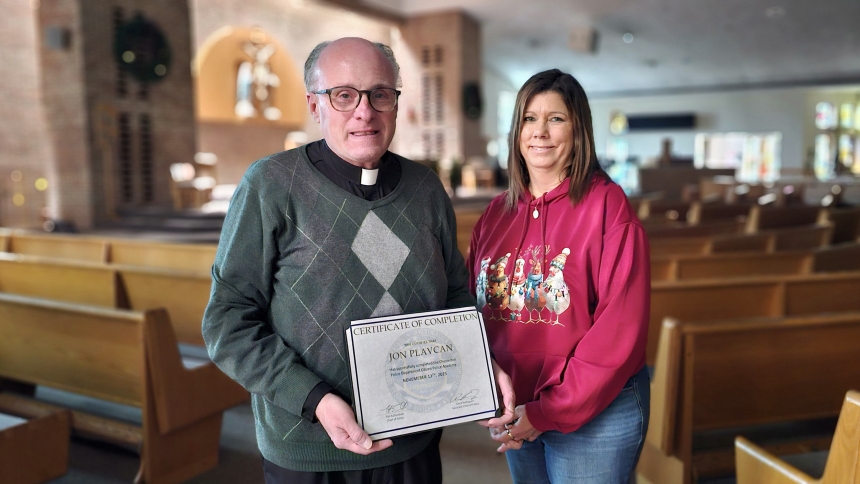
ST. JOHN – Dozens of grandparents attending a Boomers and Beyond luncheon on Jan. 8 gasped as they heard first-hand stories about teenagers victimized by sexual predators through social media.
The stories came from Special Agent Steve Moran from the Hammond office of Homeland Security Investigations, guest speaker at the St. John the Evangelist gathering along with Supervisory Special Agent Phil Coduti, a deacon at the parish.
“Technology created these monsters, and only technology can take them away,” said Moran, noting that every young victim asked to draw a picture of their perpetrator “draws some kind of monster.”
An Evergreen Park, Ill. native, Moran worked two years for the U.S. border patrol and five years with the U,S. Secret Service before joining the U.S. Department of Homeland Security in 2020. The number of reports about online predators targeting children and teens “has exploded since COVID,” he noted. “The number reached more than one million annually for the first time in 2014, as recorded by the National Center for Missing and Exploited Children, and stood at 36 million in 2023, the last year for which we have complete figures.
With a shortage of investigators, “We are forced to triage our cases, which creates a backlog,” he added. Still, while predators are getting more sophisticated, forensic specialists are also becoming more sophisticated as their training improves. “If there is a shampoo bottle in the background of a video, we can trace that to a store and get the name of the town where a victim lives, helping trace them, and one predator was identified by getting his fingerprint from a video,” said Moran.
He stressed that all ages of cell phone users should keep their location on privacy settings and limit the amount of personal information they post or share on Instagram and SnapChat, the top two apps used by sexual predators to reach youths. They are very good at finding out where a youth goes to school or lives, which makes it easy to identify them.
Popular ways to victimize pre-teens and teens include posing as a boy or girl who is the same age as the victim with fake photos, asking the victim for a sexually suggestive photo of themselves and gradually making requests for more sexually explicit photos and videos. When the victim balks, they are threatened with the release of their previous photos to their friends or their school Facebook page. “I want another (nude) photo right now, or everyone you know will see what you’ve already sent me,” a predator may say.
Young people often comply because they are afraid to tell their parents or authorities, Moran noted.
Deacon Coduti said some families have had success by signing a “contract” with their child, who promises to tell their parents if they are ever blackmailed in exchange for a promise that their parents will help them and not blame them.
Another way predators get to youth is through video games like Fortnite and Minecraft, pretending to be another teen and luring a victim to switch to a game chat room where they can be groomed to exchange sexually explicit photos – not realizing the adult predator is sending fake or altered pictures.
“A predator can be a neighbor, a family friend, someone who cultivates a friendship with a father to get to their child,” warned Moran. “We have arrested doctors, pastors, police officers, firefighters … they can be anyone.
Moran said that when he makes his teen-level presentation about the iGuardian program, “it’s not if, but how many, young people will come up to me afterward and admit they are victims. “We want to make iGuardian as familiar to kids as was Stranger Danger. We want them to know how to avoid becoming a victim.”
Yolande Sobkowicz, a St. John the Evangelist parishioner from Cedar Lake with two young grandchildren, said she is concerned about the amount of private information about people available on social media sites. “Just Google yourself and see what is available about you. It is unbelievable,” she said.
“Parents can’t let their children out of their sight,” she added. “They can be snatched from your own yard (once a predator finds them online).”
Tony Lutgen, of Lowell, came with his wife to the Boomers and Beyond luncheon as the couple awaits the birth of their first two grandchildren in 2025. “We went to see a movie about sex trafficking, and it got our curiosity aroused (about this danger),” he said. “I have a lot of respect for officers who work in that field. It’s not glamorous.
Lutgen added that parents and grandparents need to use caution about monitoring the computer and cell phone use of youngsters.
“These predators even create their own communities online with other predators, and that gives them affirmation,” said Moran. “Things can happen very fast, and the most popular chat rooms and apps change very fast, too.”
If a parent allows HSI to borrow a child’s phone, “we can do a complete forensic analysis that may identify the predator. There are techniques we can use, but we need cooperation.
For more information or to report a suspected case of sexual exploitation, contact Deacon Coduti at (630) 271-4683 or philip.coduti@hsi.dhs.gov or Moran at (224) 301-5304 or steven.moran@hsi.dhs.gov, the national tipline at (866) 347-2423, or visit know2protect.gov.
Caption: "Google yourself and you will be shocked at the information about you that is available to anyone online!" Yolande Sobkowicz (right), of Cedar Lake, told fellow Boomers and Beyond members (from left) Marge Gasior and Judy Grenawalt, both of St. John during a luncheon program on Jan. 8 about how to protect children and teenagers from online sexual exploitation. (Marlene A. Zloza photo)


